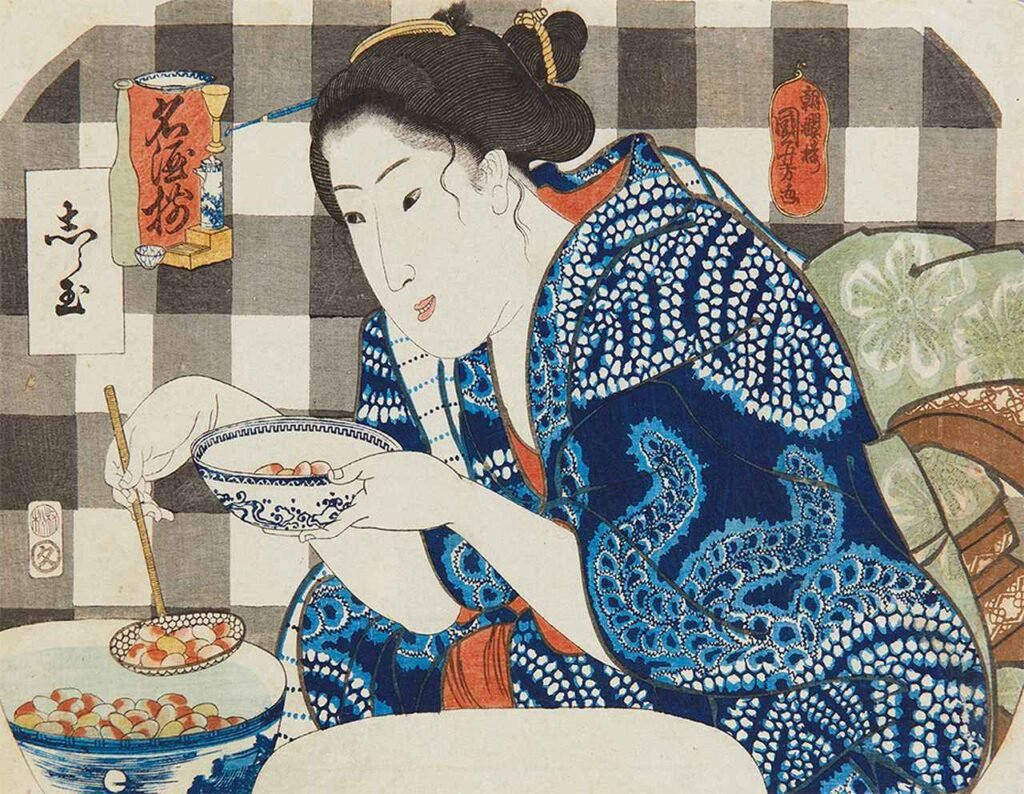Search for Vegetarian, Vegan,
Halal restaurants and more in Japan!
Search for Vegetarian, Vegan, Halal restaurants and more in Japan!

Utagawa Kuniyoshi
Vegetarianism has long been embedded in Japanese tradition, particularly through the practice of shōjin ryōri (精進料理), the plant-based cuisine developed in Buddhist temples. For centuries, monks have followed a strictly vegetarian diet as part of their spiritual discipline. This cuisine avoids not only meat and fish, but also pungent ingredients like garlic and onions, believed to disrupt meditation. Shōjin ryōri reflects a philosophy of mindful eating and continues to influence Japanese food culture today.
While Japan has embraced vegetarianism through its Buddhist heritage, veganism is still charting its course in the modern landscape. It’s fair to say it remains relatively niche, but the winds of change are definitely blowing! Awareness is steadily growing, particularly in the major urban centers. You’ll now find a delightful and increasing number of vegan cafés serving everything from plant-based parfaits to cruelty-free croissants, innovative vegan bakeries crafting delectable treats, and even dedicated ramen shops where the broth and toppings are entirely plant-based. While not ubiquitous, the vegan scene in Japan’s big cities is vibrant and expanding, like a seed finally sprouting in fertile ground.
The concepts of strictly gluten-free or ketogenic diets are still relatively new to mainstream Japanese culinary thinking. While health-conscious individuals are increasingly aware of these dietary approaches, they aren’t yet widely understood by the general populace. You might encounter blank stares or confusion when using these terms in smaller establishments. It’s more effective to explain what you can’t eat (e.g., “I can’t eat wheat” – 小麦は食べられません komugi wa taberaremasen) rather than relying on the labels of “gluten-free” or “keto.” Think of it as a linguistic bridge you might need to build!
Precisely! Buddhism, upon its arrival in Japan centuries ago, brought with it the practice of vegetarianism for its monastic followers. This principle of non-harming and spiritual purity is directly reflected in the development and continuation of shōjin ryōri. This temple cuisine is a direct culinary descendant of Buddhist tenets, showcasing the beauty and versatility of plant-based ingredients prepared with meticulous care and intention. So, yes, Buddhism is the primary historical and philosophical bedrock of vegetarianism as a recognized dietary practice in Japan.
This is a common point of potential confusion. In a departure from Western understanding, some Japanese individuals might indeed assume that fish is an acceptable food for vegetarians. This stems from a cultural perspective where “meat” often primarily refers to land-based animals. Therefore, it’s absolutely crucial to explicitly clarify that when you say you are vegetarian, you also abstain from fish and seafood. A simple and direct phrase like “私は魚も食べません” (Watashi wa sakana mo tabemasen – I don’t eat fish either) will save you from unexpected encounters with tuna flakes!
Dashi is an omnipresent supporting actor in countless Japanese culinary creations. It forms the very foundation of flavor for a vast array of soups, sauces, simmered dishes, and more. Traditionally, it’s most commonly made from katsuobushi (dried bonito flakes) or niboshi (dried sardines), lending a deep, savory umami that is considered essential to the Japanese palate. Its pervasive use is a testament to its fundamental role in shaping the distinctive taste profiles of Japanese cuisine. It’s so ingrained that it can sometimes feel like it’s in everything!
Religion has subtly yet profoundly shaped the Japanese culinary landscape:
Buddhism: As mentioned above, Buddhism’s influence is most evident in shōjin ryōri, the sophisticated vegetarian temple cuisine that emphasizes simplicity, seasonality, and respect for ingredients.
Shinto: Japan’s indigenous religion, Shinto, with its deep reverence for nature, emphasizes the importance of seasonal and natural foods. It often involves offering fresh produce and seafood to deities. While not strictly vegetarian, it fosters a connection to the bounty of the land and sea.
Modern Secular Food Culture: While these religious influences remain part of the culinary heritage, modern Japanese food culture is largely secular, embracing a wide range of ingredients and global influences. However, the underlying appreciation for fresh, seasonal ingredients and the delicate balance of flavors perhaps subtly echoes these historical roots.
Awareness of food allergies is definitely on the rise in Japan, particularly in major cities, airports, and tourist-centric areas. You’ll find more labeling and some restaurants are becoming more accommodating, and it is not uncommon in a restaurant to be asked about allergies when ordering. However, in smaller, more traditional establishments, or in more rural areas, familiarity with specific allergies might still be limited.
Tip: Relying solely on verbal explanations can be risky. Carry a well-translated allergy card in Japanese that clearly lists your allergens and the severity of your reaction. It’s your silent but powerful advocate at the table.